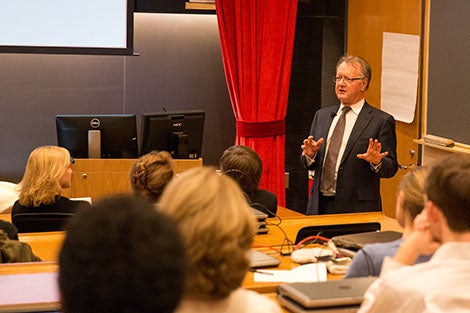February 26, 2016 — John Quelch is an ambassador for public health in the business world. A professor at Harvard’s business and public health schools who holds master’s degrees from both, Quelch told an audience at a recent event discussing his new book Consumers, Corporations, and Public Health, that he believes both fields can inform and benefit the other.
“Every company has a public health footprint,” said Quelch, who is professor of health policy and management at the Harvard T.H. Chan School of Public Health and the Charles Edward Wilson Professor of Business Administration at Harvard Business School (HBS).
What he means by a “public health footprint” is that every corporation’s products and policies have the potential to help — or hurt — health and well-being of the public by their effects on consumers; the company’s own employees; communities; and the environment. While some companies do little more than what is legally required, others go above and beyond compliance, and find that doing good can help their brand reputation — and their bottom line.
Since last spring, Quelch has been teaching a course for public health and business students that highlights real-world examples of the intersection of health and corporate policy in industries from cruise ships to clothing manufacturers. Material from the course has been collected into his new book which Quelch discussed with a Harvard Chan audience at the Dean’s Distinguished Lecture February 22, 2016 in Kresge G-2.
What businesses understand that many in public health do not is consumer behavior, Quelch said. He pointed to the recent controversy in New York City over Mayor Michael Bloomberg’s attempt to limit portion sizes of sugary beverages. Despite evidence that sodas and other high-calorie drinks increase the risk of obesity, diabetes, and other health problems—and would still be available in fairly large sizes—many people were outraged over what they saw as “nanny state” overreach.
“Public health people assume that the consumer will respond in a logical manner, but people don’t like to be told what to do,” Quelch said. Learning what corporations do right may help public health practitioners better tune their pitches, he added.
Quelch said that he sees his roles at HBS and Harvard Chan as a way to build bridges between public health and business. He hopes to raise awareness of the importance of public health research among HBS alumni and to foster collaborations between faculty and students of both schools.
In remarks following Quelch’s presentation, Meredith Rosenthal, professor of health economics and policy and associate dean for diversity likened Quelch’s course to the “international space station,” where opposing sides can meet to find common ground and learn from each other.
Quelch said that in the early weeks of the course, it is easy to tell which school students come from. But as the course progresses, students start to meet more towards the middle, learning that “corporations are not all good, but they are not all bad, either.”
In April, Quelch will join Howard Koh, Harvey V. Fineberg Professor of the Practice of Public Health Leadership, in co-hosting a conference for invited business leaders at HBS that further aims to “elevate the importance of health as a new agenda in business,” he said.
Quelch also is program director for Harvard Chan’s Continuing Education course Customer-Driven Strategies for Health Care Professionals, next held from June 1–3, 2016.
Photo: Sarah Sholes
